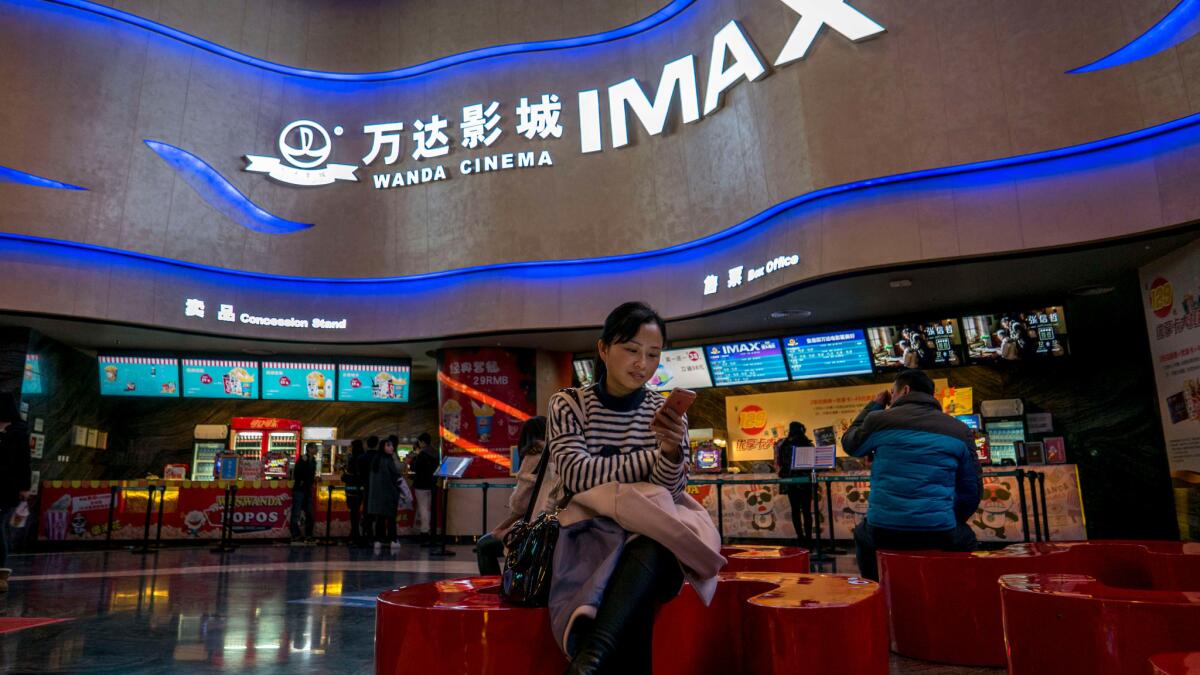A dramatic box-office slowdown in China has Hollywood nervous

- Share via
Reporting from Beijing — At the Wanda Imax theater in Beijing’s bustling Central Business District, shopping mall patrons passed the time on couches in the lobby as they waited to meet friends on a Wednesday afternoon — but many weren’t there to see movies.
Some in fact, like 21-year-old Tian Zhuanghui, said a lack of good films have kept them away from the multiplex.
For the record:
12:57 p.m. Jan. 23, 2025An earlier version of this story gave an incorrect date for the year when China’s box office could reach $30 billion.
“I watch movies a lot less now,” Tian, a recent university graduate, said with a shrug. “I just don’t have the desire to anymore. The excitement is gone.”
Tian, who prefers fantasy and science fiction pictures, is far from alone in her waning interest. Her sentiment reflects a surprising plot twist in the world’s second-largest film market: a dramatic box-office slowdown.
Ticket sales in China during the last six months have been down by 10% compared with the same period last year, according to EntGroup, a Beijing-based research firm. That’s a striking turnaround for a country that saw a nearly 50% jump in box office receipts in 2015 to $6.78 billion, leading many people to believe that mainland China would overtake the U.S. and Canada as the world’s No. 1 market as soon as next year. But a weak summer season has dampened the hype.
Movie ticket receipts are weakening even though cinema chains are still building theaters at a rapid pace.
The headwinds have caused growing anxiety in an increasingly global-focused Hollywood, which has placed big bets on the burgeoning appetite of Chinese consumers for entertainment. U.S. studios are increasingly gearing their would-be blockbusters to appeal to audiences in China, and doing deals with local companies to improve their chances of doing big business there.
Experts have scrambled to explain the phenomenon, citing a poor film lineup, a lack of discounts from online ticket sellers, and increased government scrutiny of phony box office statistics.
“There are a lot of things to be concerned about, and a slowdown in the box office there is one of them,” said Rob Cain, a producer and veteran studio consultant on China. “A lot of Chinese audiences are getting tired of paying good money for bad films.”
The slowdown has sparked a sharp reaction from some Chinese investors eager to court Hollywood.
China’s richest man, Wang Jianlin, chairman of cinema and real estate giant Dalian Wanda Group, tried to quell concerns last week during a speech to Hollywood executives in Los Angeles. Wang, who came to a Los Angeles County Museum of Art event to tout his new $8.2 billion, 408-acre movie production complex in Qingdao, stressed that the box office would continue to show strong growth throughout the next decade, despite the current hiccups.
“I believe any pessimism about China’s film market is inaccurate,” Wang said, according to an English language transcript of his speech last Monday night. “As China continues its urbanization, as the number of shopping malls grows, and as the income of the Chinese population rises, China’s film market will maintain a fast growth rate over the next 10 years.”
Nonetheless, it’s become clear that the torrid pace of the past several years is not sustainable. Wang said China’s box office sales should increase up to 15% annually during the next decade, meaning the industry could reach $30 billion by 2026 — three times the size of North America ($11.1 billion in 2015).
Analysts blame the slowdown partly on a leap in prices consumers have to pay for tickets sold online. For years, tech companies such as Alibaba Group and Tencent offered aggressive subsidies discounting tickets as much as 50% in order to fight for market share. That practice has been cut back significantly now that the ticket sellers are under increasing pressure to turn profits. The average ticket price in China is about $5, compared with $8.51 in the U.S.
Industry observers also single out the past manipulation of box office statistics by private companies that inflated the successes of their movies in previous years. In March, Chinese regulators launched an investigation into online ticket sellers to find out if they had inflated the sales numbers for the martial arts movie “Ip Man 3,” starring Donnie Yen and Mike Tyson.
The crackdown on the practice by China’s government regulators raised questions about the reliability of the overall statistics for the Chinese market. The sudden sluggishness may reflect greater transparency in the market, and could cause headaches for investors and studios who had hoped for easier returns on their movies.
“It may cause some short-term dislocation,” said Marc Ganis, co-founder and managing director of Jiaflix Enterprises, which helps studios distribute movies in China. “This is significant and meaningful, but it ought not to reduce the interest in the Chinese market.”
Then there is the issue of quality, or lack thereof. China needs better movies in order to draw the masses to cinemas. Wanda Group’s Wang, along with many analysts, said the box office boom inspired a wave of investment in pictures that were rushed to market in order to take advantage of the upswing. While the industry fielded a couple of homegrown blockbusters including “The Mermaid” ($526 million in China) this year, there were a number of movies with major stars that did poor business, such as the comedy “Papa,” historical adventure “Xuan Zang” and the war flick “Brothers.”
Lawrence Wang, China regional manager for cinema technology provider Vista Group, said sacrificing quality has backfired.
“Because the market is crazy, people are thinking any film can make money,” he said. “But it’s an illusion. The audiences there have their own taste, and they can tell if the film is not good.”
Hollywood itself may be partly responsible for the stalled growth in China. Last year’s box office boom in the world’s most populous country was partly fueled by American blockbusters like “Jurassic World” and “Furious 7” that have been in short supply this year.
See the most-read stories in Entertainment this hour »
Movie producers and studio executives in Los Angeles privately downplayed the long-term significance of the China slump, but acknowledged that studios have to do a better job of studying the tastes of Chinese moviegoers. To many, China remains an enormous untapped opportunity. People there see an average of less than one movie each year, whereas their U.S. counterparts buy almost four tickets each annually. Analysts and executives hope Chinese per capita attendance continues to grow as more of the population has access to local movie theaters.
Recent sluggishness at the box office hasn’t curtailed deal making on either side of the Pacific.
Chinese film production and marketing company Huahua Media said last week it would invest in Paramount Pictures’ upcoming Brad Pitt World War II movie “Allied.” That comes on the heels of Alibaba Pictures’ agreement to co-produce and co-finance movies with Steven Spielberg’s Amblin Partners.
Sony Pictures in September secured a commitment from Wanda to invest in a handful of its major projects, in hopes of giving its films a leg up in the country. While Wanda has been the most aggressive in the space, studios and production companies have also lined up to work with Chinese partners like Tencent, Alibaba, Hunan TV and Fosun International. Last year, Warner Bros. and China Media Capital set up a joint venture called Flagship Entertainment Group to make local-language movies.
In turn, China film companies have turned to U.S. studios to learn more about the art and craft of modern filmmaking. Hollywood exports such as Disney’s “Zootopia” and Legendary Entertainment’s “Warcraft” continue to generate a considerable portion of the overall theatrical revenue. Success in the Chinese box office can determine whether a movie is profitable.
Better Chinese movies would be welcome news for 20-year-old Wang Yi, who had just exited a showing of the computer animated “L.O.R.D.: Legend of Ravaging Dynasties” at the Beijing Central Business District theater.
Wang said she used to go to the movies twice a week, whenever there was a new release. Now she comes half as often.
“There are fewer good Chinese movies,” she said. “American blockbusters, especially superhero movies, are more fast-paced and exciting.”
Times staff writer Faughnder reported from Los Angeles. Special correspondent Wang reported from Beijing. Nicole Liu in The Times’ Beijing bureau contributed to this report.
Follow Ryan Faughnder on Twitter for more entertainment business coverage: @rfaughnder
ALSO
‘Walking Dead’ cast says a tearful goodbye to Negan’s victims at the premiere
Bobby Vee, 1960s pop singer, dies at 73
Oscar Watch: Latest predictions with good news for ‘Moonlight’ and ‘Loving’
More to Read
From the Oscars to the Emmys.
Get the Envelope newsletter for exclusive awards season coverage, behind-the-scenes stories from the Envelope podcast and columnist Glenn Whipp’s must-read analysis.
You may occasionally receive promotional content from the Los Angeles Times.











